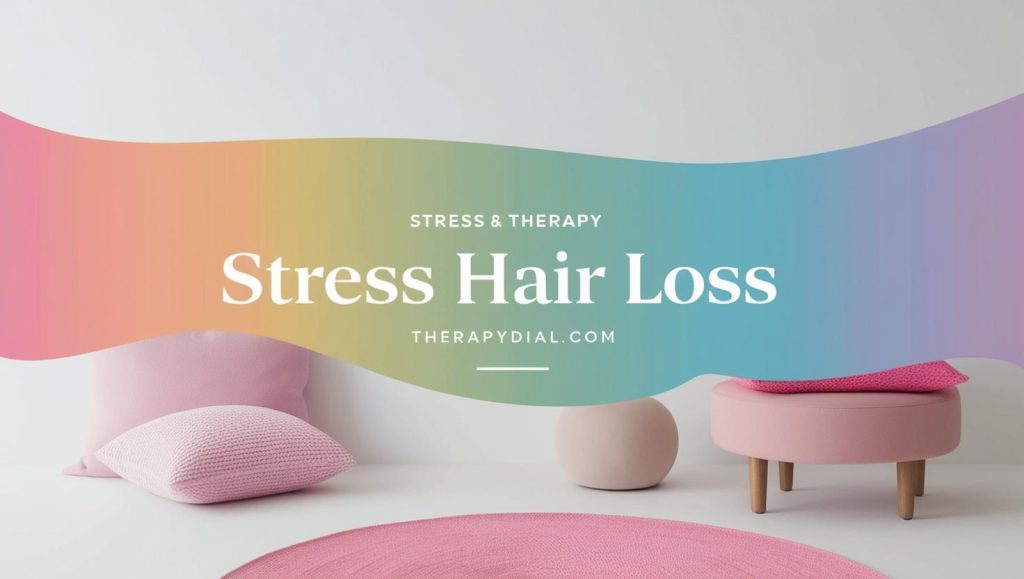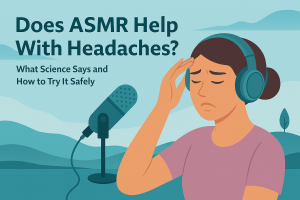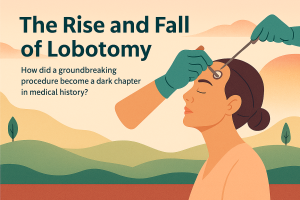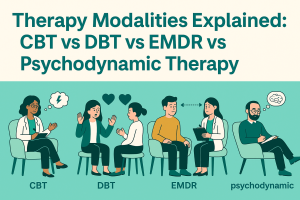Have you ever brushed your hair and noticed way more strands coming out than usual? Or found a surprising amount of hair clogging your shower drain?
If you’ve been under stress lately, you’re not alone — and neither is your hair loss. In this guide, straight from top NYC dermatologists, we’ll walk you through how stress affects your hair and the best natural remedies to fight back. Let’s get into it!
Understanding the Link Between Stress and Hair Loss
Stress and hair loss are more connected than you might think. It’s not just an old wives’ tale — modern dermatology backs it up with science. When you experience high stress levels, your body releases hormones like cortisol, which can push your hair follicles into a resting phase, known as telogen effluvium.
What Happens to Your Hair During Stress?
Imagine your hair like a garden. Normally, you’re growing new “plants” all the time. But when stress hits, it’s like someone turned off the watering system. New growth slows down, and existing hair falls out more easily.
Here’s how it works:
-
Cortisol spikes: High stress hormones disrupt the hair’s natural growth cycle.
-
Follicles go dormant: Instead of growing, hair enters the resting (telogen) phase.
-
Shedding increases: After a few months, hair falls out — sometimes in clumps.
According to a study by the American Academy of Dermatology, telogen effluvium is one of the most common causes of temporary hair loss. It usually occurs two to three months after a major stress event.
Common Types of Stress-Related Hair Loss
There are actually different forms of stress-induced hair loss:
-
Telogen Effluvium: Most common; causes diffuse thinning all over the scalp.
-
Alopecia Areata: Stress can trigger this autoimmune condition where patches of hair fall out.
-
Trichotillomania: A psychological condition where individuals pull their own hair out due to anxiety.
Understanding which type you’re dealing with is critical because the treatment approaches vary. Let’s dive into how dermatologists figure this out.
How Dermatologists Diagnose Stress-Related Hair Loss
When you visit a dermatologist for hair loss concerns, don’t expect them to just take a quick glance and send you off. Diagnosing stress-related hair loss is actually a thorough process.
Tests and Assessments
Typically, dermatologists in NYC — like those at Schweiger Dermatology Group — start with a comprehensive consultation, including:
-
Scalp Examination: Checking for inflammation, scaling, or patchy hair loss.
-
Pull Test: Gently tugging on sections of hair to see how easily it comes out.
-
Blood Tests: To rule out nutritional deficiencies or hormonal imbalances.
-
Biopsy: Rare, but sometimes a small piece of scalp skin is analyzed under a microscope.
This multi-pronged approach helps ensure that the diagnosis is accurate and that they’re not missing any underlying health issues.
Why Accurate Diagnosis Matters
You wouldn’t try to fix your car without knowing what’s wrong with it first, right? Same with your hair. Misdiagnosis can lead you down the wrong treatment path, wasting precious time and money — and possibly making the situation worse.
An accurate diagnosis enables:
-
Targeted treatment plans
-
Faster recovery timelines
-
Preventing further hair loss
Now that we understand the basics, let’s talk about the real reason you’re here — what you can do about it, naturally!
5 Natural Remedies Recommended by NYC Dermatologists
Treating stress-related hair loss doesn’t always have to mean prescription drugs or expensive treatments. Sometimes, simple, natural remedies can do wonders — especially when recommended by trusted dermatologists.
1. Scalp Massages with Essential Oils
If you love a good head massage at the spa, you’ll love this remedy even more. Regular scalp massages can significantly boost blood circulation to hair follicles, encouraging stronger, thicker hair growth.
Best Oils for Hair Growth
Not all oils are created equal. Here are dermatologist-approved options:
-
Rosemary Oil: Proven in studies to be as effective as minoxidil for hair regrowth.
-
Peppermint Oil: Refreshes and revitalizes hair follicles.
-
Lavender Oil: Calms the scalp and reduces inflammation.
Pro tip: Mix a few drops of essential oil with a carrier oil like coconut or jojoba oil before massaging into your scalp.
NYC-based dermatologists often suggest combining scalp massages with mindfulness exercises to double up on the stress-reduction effect. You can find a detailed guide on how to properly massage your scalp for hair growth here.
2. A Balanced, Nutrient-Rich Diet
You’ve heard the saying, “you are what you eat,” right? Well, your hair totally believes in it too. Stress not only messes with your hormones, but it also depletes your body of the nutrients needed for healthy hair growth.
Foods That Strengthen Hair Naturally
If you want your hair to bounce back, you need to load up your plate with the right foods. NYC dermatologists often recommend a diet rich in:
-
Protein: Hair is made mostly of keratin, a type of protein. Good sources? Eggs, fish, and legumes.
-
Iron: Low iron levels are a big culprit for hair loss. Spinach, lentils, and lean red meat are your friends.
-
Omega-3 Fatty Acids: Found in salmon, chia seeds, and walnuts, omega-3s nourish hair follicles.
-
Biotin: This B-vitamin is a rockstar for hair health. Foods like eggs, almonds, and sweet potatoes are packed with it.
-
Zinc: A critical mineral for hair tissue growth and repair. Think pumpkin seeds and chickpeas.
Quick Tip: If you’re unsure about whether you’re getting enough nutrients, talk to a professional or check this detailed nutrition guide for healthy hair.
3. Stress-Reduction Techniques
You can’t treat stress-induced hair loss without addressing the elephant in the room: stress itself. Calming your mind is just as important as nourishing your scalp.
Meditation, Yoga, and Deep Breathing
If you’ve never tried meditation or yoga before, now’s the time. These ancient practices aren’t just for hippies — modern science backs them too.
Here’s why you should try them:
-
Meditation: Just 10 minutes a day can significantly lower cortisol levels.
-
Yoga: Gentle stretching and breath control work wonders for both mental health and blood circulation.
-
Deep Breathing: Activates your body’s natural relaxation response.
Want to get started? Check out free apps like Insight Timer or beginner yoga tutorials on Yoga with Adriene.
By incorporating mindfulness into your daily routine, you’re treating the root cause, not just the symptoms.
4. Herbal Supplements and Natural Boosters
Some of nature’s oldest remedies are making a big comeback in the world of dermatology. Several herbal supplements have been shown to reduce stress and support hair growth.
Popular Options Like Ashwagandha and Ginseng
-
Ashwagandha: An adaptogen that helps the body manage stress. It also balances cortisol, which can have a positive effect on hair.
-
Ginseng: Known to stimulate hair follicles and encourage growth.
-
Saw Palmetto: Blocks DHT, a hormone linked to hair loss, making it a favorite among dermatologists.
Always check with a healthcare provider before adding any supplements to your routine. And make sure you’re buying high-quality versions — sketchy supplements from unknown sources can do more harm than good. If you’re curious, here’s a great guide on choosing safe herbal supplements.
5. Gentle Hair Care Routine Adjustments
We all love that squeaky-clean feeling after a good wash, but harsh shampoos, rough towel-drying, and frequent heat styling can make stressed hair even worse.
Products to Avoid and Adopt
Avoid:
-
Sulfate-heavy shampoos (they strip natural oils)
-
Alcohol-based styling products
-
Excessive heat tools (straighteners, curling irons)
Adopt:
-
Sulfate-free, moisturizing shampoos and conditioners
-
Leave-in conditioners or hair masks
-
Air-drying techniques instead of blow-drying
Some dermatologist-favorite brands include Olaplex, Briogeo, and SheaMoisture.
Treat your hair like delicate silk — because when it’s stressed, that’s exactly how fragile it is.
NYC Dermatologist Insights: What Really Works?
No one knows hair loss solutions better than the dermatologists who treat it every single day. In New York City, where stress levels (and style expectations) run high, dermatologists have seen it all — from sudden bald patches to gradual thinning. Their insights are incredibly valuable if you’re serious about reversing stress-induced hair loss.
Case Studies and Real Experiences
Many NYC-based dermatologists have documented incredible transformations using natural remedies combined with minor lifestyle changes. Take Dr. Michele Green, a renowned expert in Manhattan, for example. She often sees patients improve hair density within 6 months simply by addressing nutritional gaps, prescribing scalp massages, and implementing stress management techniques.
Common themes in successful cases:
-
Consistency: Natural remedies aren’t overnight miracles; they require daily commitment.
-
Combination Therapy: Addressing stress, nutrition, and scalp health simultaneously works better than focusing on just one aspect.
-
Customized Approaches: What works for one person might not work for another. Tailoring treatments based on individual needs is crucial.
Want to see more real-world examples? The American Hair Research Society often shares case studies showcasing different hair recovery journeys.
Common Myths vs Facts About Natural Hair Regrowth
There’s a lot of bad advice floating around online — and some myths are so common that they sound believable. NYC dermatologists help set the record straight.
Myth 1: You can regrow hair instantly with coconut oil.
Fact: Coconut oil can moisturize and protect, but it doesn’t stimulate new hair growth.
Myth 2: Biotin supplements will solve everything.
Fact: Biotin only helps if you’re deficient; otherwise, it’s not a miracle cure.
Myth 3: Hair loss from stress is permanent.
Fact: In most cases, hair regrows once the stress is managed and proper care is taken.
Educating yourself on what really works saves time, money, and a lot of heartache.
Lifestyle Changes That Support Hair Recovery
If you’re serious about regrowing your hair and keeping it healthy long-term, you have to look beyond just oils and supplements. Lifestyle tweaks can make or break your recovery.
Sleep, Exercise, and Mindfulness
These three pillars are non-negotiable:
-
Sleep: Aim for 7-9 hours per night. Your body does most of its healing during sleep, including hair follicle repair.
-
Exercise: Cardiovascular activities like walking, jogging, and swimming improve blood flow to the scalp.
-
Mindfulness Practices: Daily practices like journaling, meditation, or even simple gratitude exercises lower cortisol levels.
There’s a reason high-powered NYC professionals are now frequenting yoga studios and wellness retreats — they know that mental health is physical health, including the health of their hair.
Need a nudge in the right direction? Apps like Calm and Headspace offer fantastic guided meditations to jumpstart your mindfulness journey.
Avoiding Common Stress Triggers
You can’t eliminate all stress — especially not in a place as fast-paced as NYC — but you can manage how you respond to it.
Here’s how:
-
Set clear boundaries: Don’t overcommit yourself.
-
Prioritize tasks: Focus on what really matters.
-
Limit screen time: Constant digital stimulation keeps your stress hormones high.
-
Stay connected: Build a strong support system of friends and family.
Protect your peace like you would protect your hair — because the two are more connected than you think.
When to See a Professional for Hair Loss
While natural remedies can do wonders, there are times when it’s best to get professional help — and fast.
Signs You Shouldn’t Ignore
If you experience any of the following, book a dermatologist appointment immediately:
-
Sudden, patchy hair loss
-
Scalp pain, redness, or scaling
-
Significant hair thinning in a short period
-
No improvement after 6 months of natural remedies
Early intervention can often prevent further loss and boost the chances of full recovery.
Advanced Treatments Beyond Natural Remedies
When natural solutions aren’t enough, NYC dermatologists offer high-tech treatments like:
-
Platelet-Rich Plasma (PRP) Therapy: Stimulates dormant hair follicles using your own blood plasma.
-
Low-Level Laser Therapy (LLLT): Boosts cellular activity to promote hair growth.
-
Prescription Medications: Such as minoxidil (Rogaine) and finasteride (Propecia).
Learn more about modern hair restoration options at the International Society of Hair Restoration Surgery.
Conclusion
Stress-induced hair loss can feel overwhelming — but it’s not a life sentence. With the right mix of natural remedies, lifestyle changes, and professional insights, you can absolutely restore your hair’s health. The key? Be patient, stay consistent, and listen to your body.
Whether it’s treating yourself to a scalp massage after a long day, whipping up a nutrient-packed smoothie, or taking five minutes to breathe deeply, every small step adds up. Your future, fuller hair will thank you for it.
Stay committed. Stay kind to yourself. And watch as your hair (and confidence) grows back stronger than ever.
FAQs
Can hair grow back after stress-induced hair loss?
Yes, in most cases hair grows back naturally within 6-9 months after the stressor is resolved and proper care is taken.
How long does it take to recover from telogen effluvium?
Typically, hair regrowth starts 3-6 months after the shedding phase, but full recovery can take up to a year depending on the individual.
Are over-the-counter hair growth products safe?
Many OTC products are safe if used as directed, but it’s always best to consult a dermatologist before starting anything new.
Can changing my shampoo really stop hair loss?
Not entirely, but using a gentle, sulfate-free shampoo can help create a healthier scalp environment for hair regrowth.
Should I take biotin supplements for hair regrowth?
Only if you’re deficient. Otherwise, focusing on a balanced diet rich in vitamins and minerals is usually more effective.




